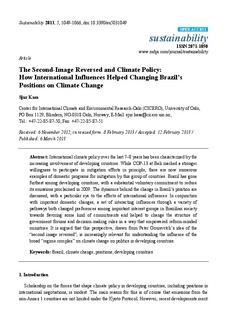The Second-Image Reversed and Climate Policy: How International Influences Helped Changing Brazil’s Positions on Climate Change
Original version
Kasa, S. (2013). The Second-Image Reversed and Climate Policy: How International Influences Helped Changing Brazil’s Positions on Climate Change. In: Sustainability 5(3), 1049-1066 10.3390/su5031049Abstract
Engelsk sammendrag (abstract): International climate policy over the last 7–8 years has been characterized by the increasing involvement of developing countries. While COP-13 at Bali marked a stronger willingness to participate in mitigation efforts in principle, there are now numerous examples of domestic programs for mitigation by this group of countries. Brazil has gone furthest among developing countries, with a substantial voluntary commitment to reduce its emissions proclaimed in 2009. The dynamics behind the change in Brazil’s position are discussed, with a particular eye to the effects of international influences. In conjunction with important domestic changes, a set of interacting influences through a variety of pathways both changed preferences among important interest groups in Brazilian society towards favoring some kind of commitments and helped to change the structure of government forums and decision-making rules in a way that empowered reform-minded ministries. It is argued that this perspective, drawn from Peter Gourevitch’s idea of the ―second image reversed‖, is increasingly relevant for understanding the influence of the broad ―regime complex‖ on climate change on politics in developing countries.
Description
Fagfellevurdert artikkel, utgitt i Sustainability 2013
